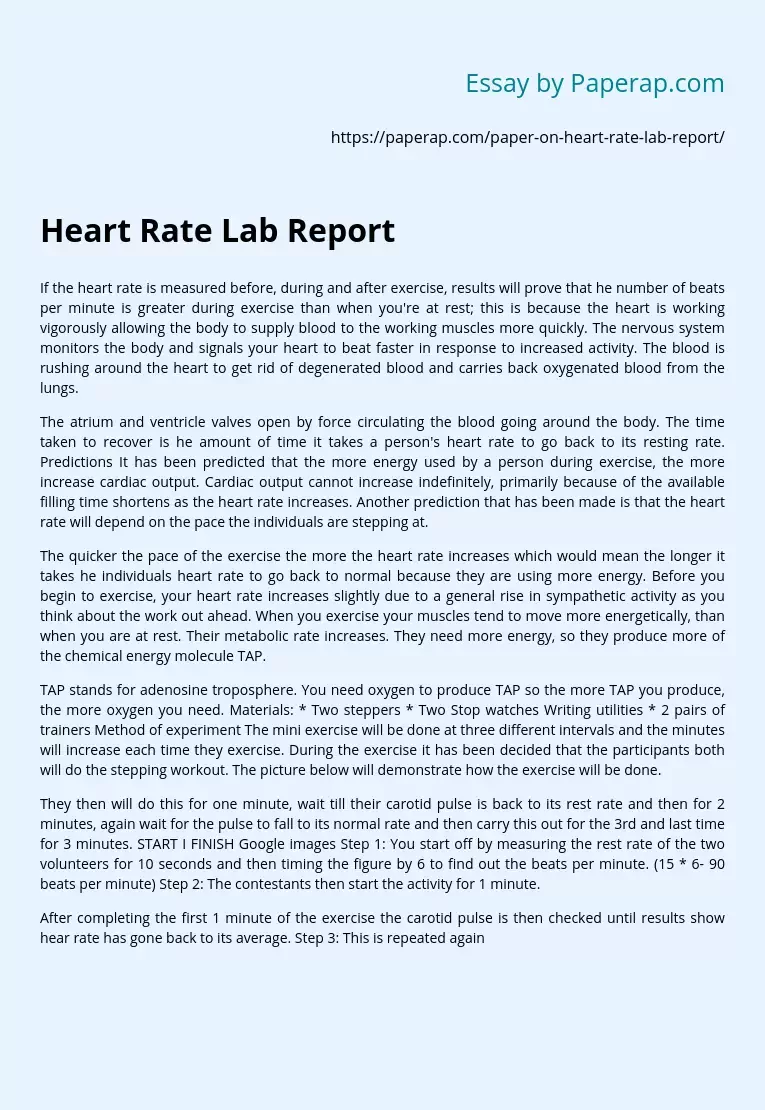Heart Rate Lab Report
If the heart rate is measured before, during and after exercise, results will prove that he number of beats per minute is greater during exercise than when you’re at rest; this is because the heart is working vigorously allowing the body to supply blood to the working muscles more quickly. The nervous system monitors the body and signals your heart to beat faster in response to increased activity. The blood is rushing around the heart to get rid of degenerated blood and carries back oxygenated blood from the lungs.
The atrium and ventricle valves open by force circulating the blood going around the body. The time taken to recover is he amount of time it takes a person’s heart rate to go back to its resting rate. Predictions It has been predicted that the more energy used by a person during exercise, the more increase cardiac output. Cardiac output cannot increase indefinitely, primarily because of the available filling time shortens as the heart rate increases.
Another prediction that has been made is that the heart rate will depend on the pace the individuals are stepping at.
The quicker the pace of the exercise the more the heart rate increases which would mean the longer it takes he individuals heart rate to go back to normal because they are using more energy. Before you begin to exercise, your heart rate increases slightly due to a general rise in sympathetic activity as you think about the work out ahead. When you exercise your muscles tend to move more energetically, than when you are at rest.
Their metabolic rate increases. They need more energy, so they produce more of the chemical energy molecule TAP.
TAP stands for adenosine troposphere. You need oxygen to produce TAP so the more TAP you produce, the more oxygen you need. Materials: * Two steppers * Two Stop watches Writing utilities * 2 pairs of trainers Method of experiment The mini exercise will be done at three different intervals and the minutes will increase each time they exercise. During the exercise it has been decided that the participants both will do the stepping workout. The picture below will demonstrate how the exercise will be done.
They then will do this for one minute, wait till their carotid pulse is back to its rest rate and then for 2 minutes, again wait for the pulse to fall to its normal rate and then carry this out for the 3rd and last time for 3 minutes. START I FINISH Google images Step 1: You start off by measuring the rest rate of the two volunteers for 10 seconds and then timing the figure by 6 to find out the beats per minute. (15 * 6- 90 beats per minute) Step 2: The contestants then start the activity for 1 minute.
After completing the first 1 minute of the exercise the carotid pulse is then checked until results show hear rate has gone back to its average. Step 3: This is repeated again for the 2nd time. The volunteers do the exercise for 2 minutes. Again, the results are recorded and time it has taken the individuals heart rate to go back to its normal rate. Step 4: The process is repeated for the third time. However, this time it is done for 3 minutes to see how the heart beat varies with intensity of exercise.
I Rest rate | 1 minute I Time taken to recover | 2 minutes I Time taken to recover | 3 minutes Time taken to recover I Shaman | 90 BPML | 132 BPML | 3 minutes | 144 BPML | 13 minutes | 150 BPML | 15 minutes I Amasser | 90 Bpml 132 BPML 1 minutes I 150 BPML | 13 minutes | 156 BPML 1 minutes I Results: BPML (Beats per minute) Discussion The results are indicting that Shaman’s and Maser’s resting rate was the same before working out. After exercising for 1 minute on the stepper, results showed there was no difference in the heart rate of both contestants.
However, the second time when the activity was carried out for two minutes, Maser’s heart rate increased more than Shaman’s although they were doing the same exercise at the same stepping pace. This could be because Maser’s body is used to the demand of energy whereas Shaman doesn’t exercise much and her body is not used to the change. Amasser eats Fiber-rich foods like oats, whole grains beans and citrus which helps the system flush out cholesterol.
On he other hand Shaman likes eating her junk food which builds fatty deposits which causes her heart rate to go so high because of the demand. Both of the contestant’s height and weight was different too which could be another reason why the heart rate is different. Other reasons why Masters heart rate may have increased more than Shamans could be because due to dehydration. Results show even though Masters heart rate is higher than Shamans, it recovers more quickly. The recovering heart rate is the number of beats per minute the heart performs after exercise.
This value is an important measure of articulators fitness, since people who return to resting heart rate faster have a more efficient heart and are at lower risk of cardiovascular disease and mortality. Conclusion The predictions that were previously made are supposed by the data. The more energy a person is using during exercise, the more the cardiac output increases. The second prediction, the faster the pace of the exercise the more the heart rate increases. This depends on how much the individual’s body is used to exercise regimes.
Heart Rate Lab Report. (2018, Jul 15). Retrieved from https://paperap.com/paper-on-heart-rate-lab-report/

